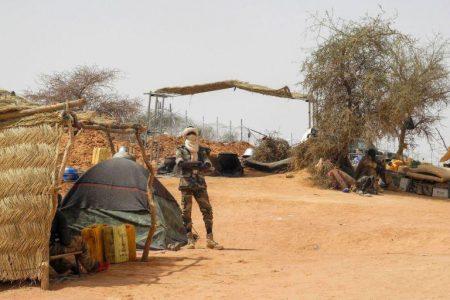
Radical Islamists have opened a new front in Mali
On Saturday, 100 armed men dressed as ethnic Dogon hunters stormed the village of Ogossagou in central Mali. They killed more than 160 ethnic Fulani civilians, including children and pregnant women, and burned many homes to the ground. Reporting is scarce, but it seems that attackers also struck the neighboring town of Welingara, which is also Fulani-majority. The Mali government blamed a Dogon self-defense group called Dan Na Ambassagou for the incident. The group denies involvement.
The attack is not a one-off incident. Rather, it is the latest and most deadly episode in a campaign of systematic violence against Fulani herders, who are being forced to flee their land. On January 1, for example, assailants struck the village of Koulogon, killing 37 people from the Fulani community. The thousands of international troops in the country—including from the G5 Sahel counterterrorism force (comprising Chad, Burkina Faso, Mali, Mauritania, and Niger), from France, and from the United Nations Multidimensional Integrated Stabilized Mission in Mali (MINUSMA)—need to act now to prevent further incidents of ethnic cleansing, retaliatory attacks, and the targeting of vulnerable communities.
Central Mali is populated by, among others, the Fulani, the Dogon, and the Bambara. The Fulani are a primarily Muslim ethnic group of seminomadic herders. Across West and Central Africa, as many as 38 million people belong to this group. The Dogon, a group of as many as 800,000 who practice a polytheistic religion (a small number practice Christianity and Islam), are largely based near the border with Burkina Faso and are mainly farmers. The Bambara, meanwhile, are the largest group in Mali. Most are primarily farmers as well and many practice Islam, although others follow traditional belief and worship ancestors.
Grievances between the three communities are longstanding, often relating to disputes over land and water. In the past, disagreements were typically resolved quickly. But containing the fighting is getting harder and harder to do. According to a 2018 Human Rights Watch report on central Mali, disputes have become increasingly complicated as the Dogon population has grown, putting pressure on the Fulani community’s grazing areas. Climate change, which has seen the Dogon moving into new areas in search of water and grass for grazing, has exacerbated tensions.
Jihadi groups have been able to exploit local concerns. Previously contained to the north by MINUSMA and the G5 Sahel force, jihadi groups have spread into the center of Mali and into Burkina Faso since 2015. Two are of particular concern. The first is the Group for the Support of Islam and Muslims (known as JNIM), which is affiliated with al Qaeda and claimed responsibility for the March 2018 attack on the French Embassy in Ouagadougou, Burkina Faso, and on Burkinabe troops near the village of Toeni in December 2018. The other group is Ansarul Islam, which was formed in 2016 and has received support from both al Qaeda and the Islamic State in the Greater Sahara.
Although Islamist terrorist groups have not taken control of territory in central Mali, they have been able to set up bases from which they launch raids on nearby villages and towns. They target the Dogon and Bambara, as well as those who are affiliated with—or provide information to—the security forces. JNIM has also conducted attacks it says are in retaliation for the targeting of the Fulani.
The jihadi groups have sought to exploit grievances among Fulani ethnic groups to boost their numbers and power in central Mali. They have exploited the Fulanis’ unhappiness over losing their lands to the Dogon to recruit them in large numbers—possibly in the hundreds, if not thousands—from their villages and towns. Some Fulani civilians are also driven to join groups linked to al Qaeda by anger about government corruption, rising crime rates, and instances of government persecution. According to the 2018 Human Rights Watch report, the Fulani Islamist leader Hamadou Koufa Diallo is particularly influential in recruiting locals.
In turn, the Dogon community has held the entire Fulani community responsible for supporting and abetting jihadi terrorist groups in central Mali. As the International Crisis Group pointed out in a March report, the alliance between jihadi groups and some of the Fulani people is not particularly natural. Jihadi groups are less interested in addressing communal grievances than in establishing a caliphate. Rather, it is driven by isolation and a lack of protection from the Malian government.
In the absence of any effective or impartial government security and law-enforcement bodies, the Dogon have established several self-defense groups, notably including Dan Na Ambassagou (“hunters who confide in God”), which was formed late in 2016 and has a political and military arm that consists of several hundred members. This group is active in what it calls counterterrorism operations, which increasingly just means indiscriminate attacks against the Fulani.
The Dogon community is not the only group responsible for the attacks, however. So-called Dozo groups, which have been active for centuries and are predominantly composed of Bambara, have also taken up arms against Islamists and against the Fulani in general.
Source: Foreign Policy





